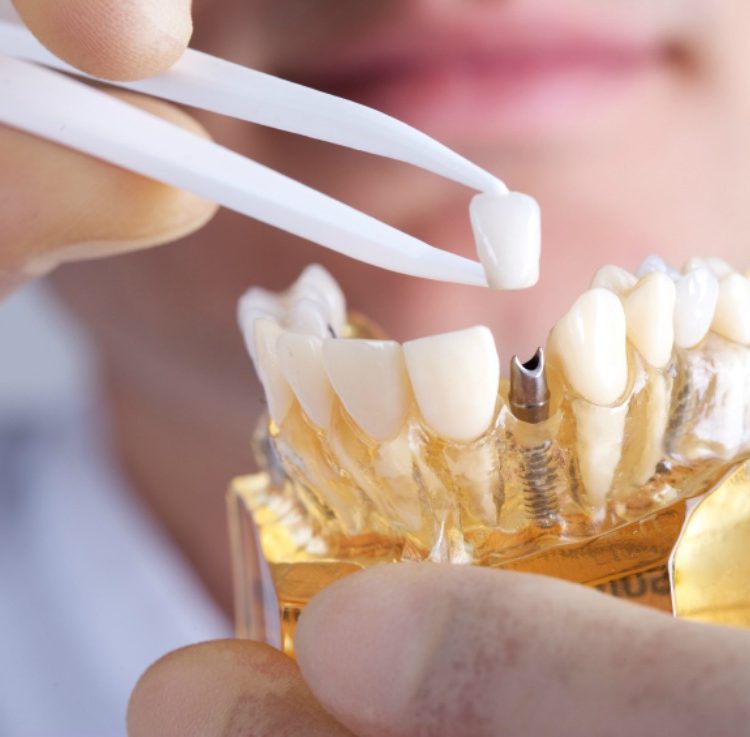

WHAT ARE DENTAL IMPLANTS?
A permanent solution for lost teeth.
Dental implants represent a common procedure of permanently replacing missing teeth without affecting neighbouring teeth.
With the help of dental implants, we can fully rectify tooth lessness and therefore strongly improve chewing and speaking abilities as well as restore a beautiful smile. Implants also serve as carriers for a fixed dental bridge or denture.

Dental Implants at Riseley Street Dental Booragoon Perth
If you require dental implants in Perth CBD, just make an appointment with Dr. Matthew Yoon or Dr. Gregory Yap at Riseley Street Dental. Our professional dentists promise to deliver the best quality and most comfortable dental implant treatment in Perth. Dental Implants enable our dentists to replace damaged or lost teeth without needing to resort to uncomfortable bridgework or dentures.
Costs of Various Dental Implants (AUD)
• Single Tooth Implant starts from ~$3999
(Including implant guide)
• Surgical implant guide $250
• Titanium implant $900
• Dental Implant Abutment $700
• Dental Crown (Porcelain fused to metal crown) $1,470
N/B: The dental implant charges above act as a guide. Accurate quotes are given after undergoing a thorough check-up by our dentists, and can vary significantly depending on your individual case and your private health insurance provider.
What You Should Know About Dental Implants
Dental Implant treatments involve the placement of a biocompatible metal tooth roots inside the jawbone to replace missing teeth. The attached crown and the abutment implant have a very similar structure to a real tooth. They are the best substitute to getting a multi-unit bridge or partial dentures as they can easily replace a single tooth.


Dental Implants Booragoon
When performing a dental implant, the crown is fixed to the implant using a third piece known as the abutment. In certain instances, the implant is fixed to a unique attachment to limit the movement of the denture (usually the lower denture). Dental implants should last for many years if rightly cared for, however poor dental hygiene could affect the longevity of the implants. Even though implants do not decay like your regular teeth, they can still have issues regarding plaque and calculus. This can often lead to gum and problems such as severe pain, bleeding or infections.
Dental Implant Procedure Experts Perth
Dental Implant surgery can be a scary and confronting process for many. However, our Perth experts are known for their extremely safe and successful procedures on many of our patients. After having a CBCT scan of our Jaw onsite prior to the surgery, reduces chair time by a large percentage. This permits our dentists to have a greater understanding of your mouth and enables greater precision while performing the procedure. Dental Implants involve inserting the metal root for the tooth into the jawbone to enable the bone to grow into it. The implant root is designed using titanium which prevents infections and ensures a long-lasting solution to the missing tooth. We also offer complete dental treatment at Riseley Street Dental in Perth, Booragoon.
Let us Handle your Implants
There are many reasons why you should let our Perth Riseley Street Dental team handle your Dental Implants.
• We offer reasonable prices
• We have experienced, qualified and full licenced dentists.
• We offer after-operation care for our patients’ even years after having the procedure.
• We use the latest technology in our treatments.
• We now offer 3D CT scan technology.
• Our dentists are kind, gentle and promise a secure and comfortable treatment.
Steps to take before undergoing Dental Implant Surgery
1. Spend time with your dentist to go through the surgery information and weigh up your different options regarding your situation. Dental implants may not be the solution for everyone.
2. If you choose to undergo dental implant surgery, your dentist will perform a diagnostic test.
What is a Diagnostic Test:
Your dentist will need to perform several tests to determine whether you are suitable for the surgery. This also helps in planning the best approach for the treatment. The tests include:
• Taking photos of the targeted area.
• Taking dental x-rays.
• Performing CT scans of your jawbone.
• Getting dental impressions of your lower and upper jaw.
At Riseley Street Dental Perth, we are fully equipped with the most up to date tools and technology needed to perform Implant Surgeries. We want our patients to feel comfortable, so they are able to speak to us regarding any concerns they may have regarding the Dental Implant Surgery.
Despite most people qualifying for implants in their jaws, there are some exceptions such as:
• Children below 17 years of age, as their jaw is still developing.
• Patients who lack enough bone in their jaw to receive an implant for the tooth. This result could call for a bone graft procedure to reconstruct the implant site.
• Patients who smoke will cause a slow healing process and may also result in failure of the implant as it prevents the osseointegration of the dental implant.
• Those who have uncontrolled diabetes risk the change of suffering post-surgery complications such as infections.
• Individuals who may be abusing drugs and alcohol will interfere with the maintenance of oral health and hygiene.
• Expectant mothers, as there are risks involved with going under aesthetic and is not worth risking the health of the unborn baby.
• Patients with psychological illness
Carrying out the Dental Implant Procedure.
Depending on how complex the dental procedure is, either a general or local anaesthesic will be used. If the patient is undergoing general anaesthesia they will be admitted into hospital for an anaesthetist to be present.
Dental Implant:
Most dental implants are manufactured using Titanium which can reinforce a solid integration into the bone tissue surrounding it. This procedure involved utilization of two or three distinct treatment stages:
1) Insertion of the Implant into the Jawbone
The placement of the abutment/ connector can be done at the same time as the implant itself.
2) Attaching the Artificial Tooth/ Crown to the Abutment
The completion of this process can take some time depending on the complexity of each case. The progression can take anywhere from 3-12 months, starting from the day of the consultation up to when the surgery occurs. Factors to consider include:
• The general fitness of the patient.
• The placement site.
• Whether or not the patient smokes.
• Types of medication taken by the patient and any health conditions.
• Whether a bone graft is needed.
• The size of the defect requiring a bone graft.
In some instances, the placement of the implant and the fitting of the abutment may be performed in one operation. However not all patients qualify for such operations and will depend on the complexity of their health and medical history. The procedure itself can take anywhere between half an hour to a few hours.
Preparing for the Implant:
The area where the implant is going to be fixed, will be prepared in a way that is exposes the underlying bone. This is commonly performed using a surgical guide with a puncture slightly bigger than the actual implant. The idea of using a single implant to replace the lost tooth does not always apply. Depending on the size of the implant, quality of the bone and the technicality of the missing tooth, the implant can support up to two missing teeth. Your dentist at Perth’s Riseley Street Dental will provide the necessary information regarding this.
Placing the Implant into Position:
The process involves screwing the Implant inside the already made drilled hole, stitching the gum closed and then roughly 10 days after the procedure removing the stiches. The implant will become more stable as time passes, since the bone will grow into the implant surface. This process is known as osseointegration and could take up to 6 months.
Placing the Abutment:
After the bone has stabilized around the implant, the abutment which acts as the connector between the crown and the implant is fitted. The dentist will first make an incision inside the gum and then place the abutment to the implant. An X-ray is usually taken to ensure the abutment is appropriately placed. A copy of the patients jaw structure is required to finalize the design of the crown, which may take a few weeks to allow for gum healing.
Final Restoration (Denture, Single Crown or Bridges):
Once the artificial crown has been finalised, it can be fitted either by screwing or cementing it into the abutment. A dental X-ray will be taken after to determine whether every component of the implant was appropriately placed.
Final Artificial Abutment:
In certain situations, the implants may be fixed to partial or full dentures to ensure they are stable. This entire process has shown many positive results and extremely high success rates.
Pre and Post Surgery:
• There are a few things that need to be done prior to the operation:
• It is important to organise someone to drive you home as you will still have the anaesthetic in your system.
• Requesting a day or two off work for recovery.
What to Expect After Surgery:
• Pain, bruising, swelling and minor headaches are all normal reactions, but normally are relived after 24 hours. Painkillers are advised to help with the pain.
• Antibiotics will be prescribed by your dentist.
• Avoid Alcohol while recovering
• Drink lots of water to help reduce swelling
• Eating soft food such as soups, for up to 6 weeks. It is advised to avoid chewy or hard foods while recovering.
• Using antiseptic solutions such as warm salty water or savacol mouth wash to rinse.
• Regular check-ups with your dentist to ensure the implant was successful.
How to Care for your Dental Implants:
If an accumulation of food and bacteria stays in your mouth, it will form a sticky coating known as plaque. This can easily form on both your natural teeth and any implants. Plaque is one of the main factors causing many gum and mouth diseases resulting in infections, inflammation or failure of the implant healing. Therefore, adhering to general dental hygiene is extremely important. We recommend following these tips to prevent any problems:
• Brushing your teeth after every meal.
• Using fluoride toothpaste to help lower the chance of decay.
• Using a soft or electrical toothbrush
• Flossing at least once a day
• Avoid smoking as this affects the healing process
• Limit sugar intake
• Regular check-ups and cleanings at least twice a year.
At Riseley Street Dental, we pay close attention to our clients needs, giving us the upper hand when addressing your problems and knowing your preferences. Our Perth, Booragoon dentists will be able to present you with the best solution that suits your condition.
If you are in need of a Dental Implant, or other general dental needs, contact our Booragoon clinic on (08) 9316 2304 or email us at reception@riseleystreetdental.com.au to secure yourself an appointment.
For any other enquiries, please send us an email and we will respond within 24 hours.
- Permanent solution
- Improved chewing and speaking
- Natural function and look
- Improved facial appearance
- Prevention of bone loss
- No special care required
- Very sturdy and secure
- No diet restrictions
- Can be changed or updated


